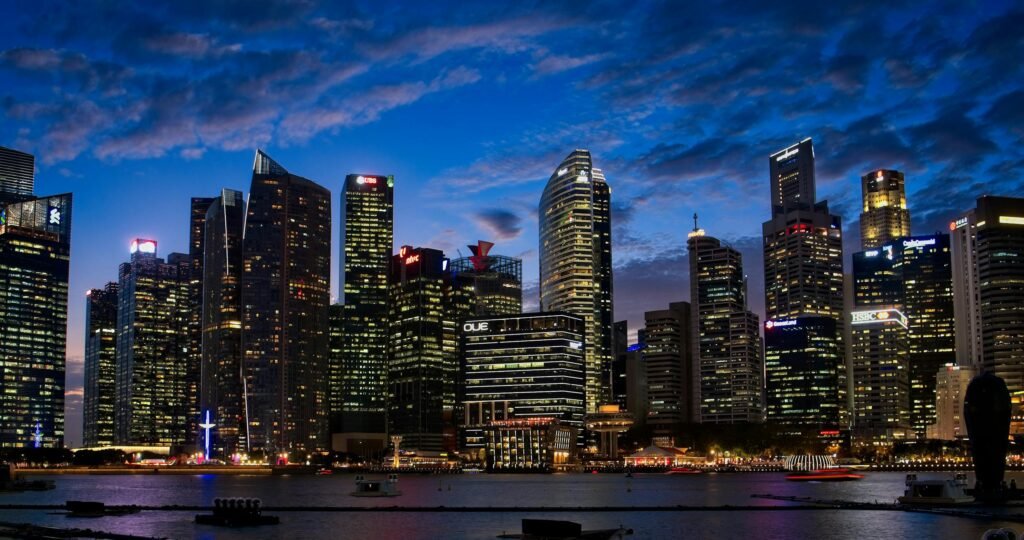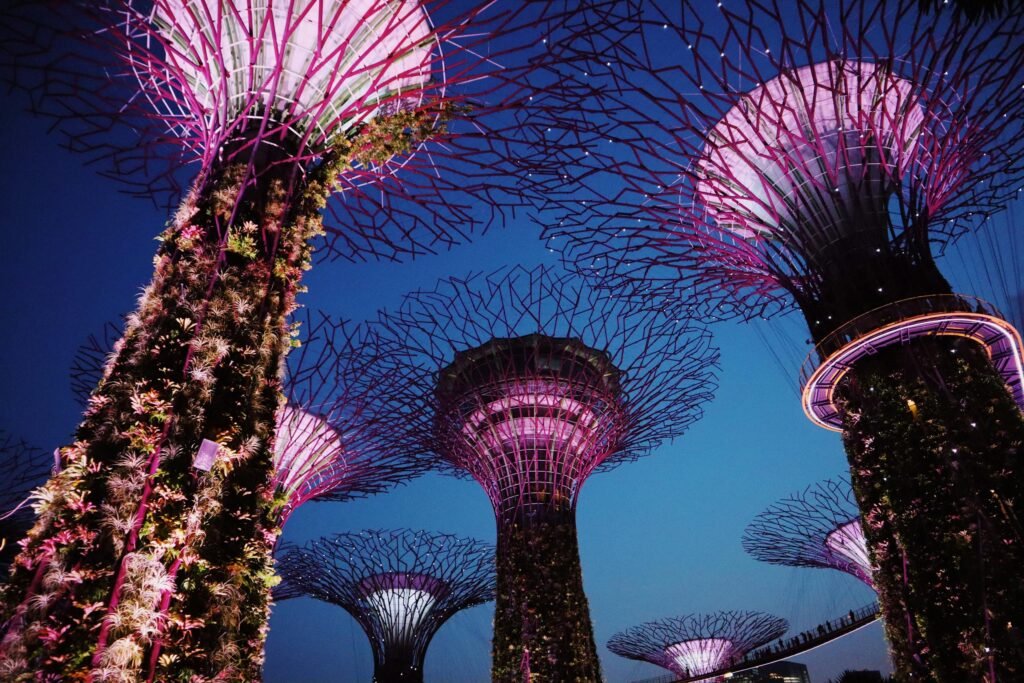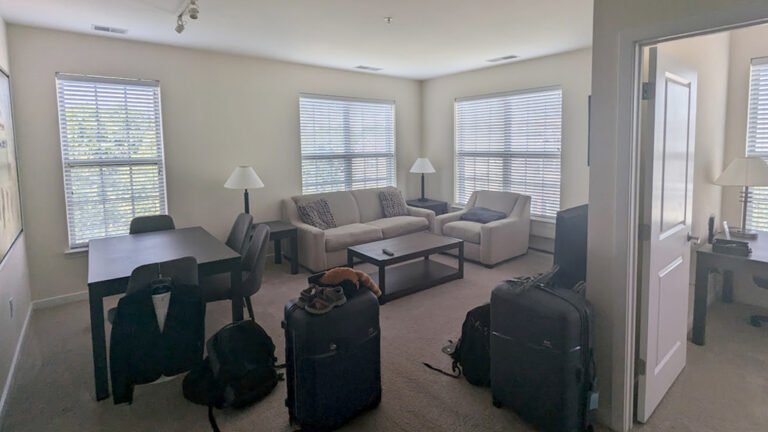Explore Singapore
Your Expat Roadmap: Explore comprehensive city guides, download valuable resources, and get insider travel recommendations curated for expats.
This rating is based on personal experiences, reader feedback, and research done with expat living in mind.
Worldwide Stats for Singapore
Out of 227 cities ranked worldwide, for cost of living and quality of life, here is how Singapore stacks up:


A Little About Singapore
Singapore, a vibrant city-state in Southeast Asia, is renowned for its cleanliness, modernity, and multiculturalism. With a population of approximately 5.7 million as of 2023, Singapore is a melting pot of cultures, with Chinese, Malays, Indians, and Eurasians forming the majority of the population.
Historically known as Temasek, meaning “sea town,” Singapore was established as a British trading post in the 19th century. It gained independence from Britain in 1965 and has since transformed into a global financial and technological hub.
Everyday life in Singapore is characterized by a fast-paced urban lifestyle, coupled with a strong emphasis on order, cleanliness, and efficiency. The city is known for its modern infrastructure, world-class amenities, and high standards of living. Singaporeans are generally friendly, English-proficient, and open to interacting with foreigners.
Geographically, Singapore is located just north of the equator, off the southern tip of the Malay Peninsula. It is surrounded by Malaysia and Indonesia and is a major shipping hub in Southeast Asia. for a refreshing escape.
More Stats on Singapore
2.5% higher cost of living, compared to Washington, DC.
Hot and humid year-round (30°C – 33°C /
86°F – 91°F).
A safety Score of 77. Singapore is Considered Very safe with low crime rates.
English is widely spoken, making it easier for expats to adapt.
Expat Living in Singapore: A Vibrant Melting Pot of Cultures
People & Culture of Singapore
Singapore is a cosmopolitan city-state with a diverse population, reflecting its rich history as a trading hub. The majority of Singaporeans are Chinese, followed by Malays, Indians, and Eurasians. This cultural diversity contributes to a vibrant and dynamic atmosphere, where different traditions and customs coexist harmoniously.
- Language: While English is widely spoken and the official language of government and business, Singapore also has four national languages: Malay, Mandarin Chinese, Tamil, and English. This multilingualism reflects the country’s diverse cultural heritage.
- Religion: Singapore is a multi-religious society with significant Buddhist, Muslim, Christian, and Hindu populations. This religious diversity fosters a culture of tolerance and respect for different faiths.
- Food: Singapore’s cuisine is a delicious fusion of Malay, Chinese, Indian, and Peranakan (Straits Chinese) influences. Enjoy a wide variety of dishes, from spicy laksa and satay to flavorful biryani and prata.
- Music & Arts: Singapore has a thriving arts and music scene, with a mix of traditional and contemporary performances. Explore the Esplanade – Theatres on the Bay, a world-class performing arts center, or visit the National Gallery Singapore for a showcase of Southeast Asian art.
- Sports & Outdoors: Singapore is passionate about sports, with popular activities including soccer, badminton, swimming, and cricket. The Singapore Grand Prix, a Formula One race, is a major sporting event held annually.
- Lifestyle: Singapore is known for its cleanliness, modernity, and high standard of living. The city offers excellent infrastructure, world-class amenities, and a safe and secure environment. Singaporeans value education, discipline, and a strong work ethic.
The Warmth of the People:
Singaporeans are renowned for their warmth, friendliness, and openness to foreigners. They are known for their politeness, punctuality, respect for authority, and social norms. This welcoming attitude contributes to Singapore’s reputation as a safe and inclusive city.
Expats often find Singaporeans to be helpful, accommodating, and eager to share their culture and experiences. The English proficiency of most Singaporeans makes it easy for foreigners to communicate and integrate into society.
Cost of Living: A Comparison with Washington DC and London
Singapore is known for its high cost of living, especially when compared to many other cities worldwide. However, it’s important to note that the standard of living and quality of life in Singapore are also correspondingly high.
Here’s a comparison of typical costs for a family of 3 in Singapore, Washington DC, and London:
| Expense Category | Singapore (SGD) | Washington DC (USD) | London (GBP) |
|---|---|---|---|
| Typical Grocery Bill (Monthly) | S$600 | $400 | £320 |
| Inexpensive Restaurant Meal | S$60 | $40 | £35 |
| Basic Utilities (Electricity, Water, Gas, Trash) | S$175 | $150 | £90 |
| Internet (60 Mbps or more) | S$70 | $70 | £50 |
| Fitness Membership (mid-range gym) | S$175 | $100 | £100 |
| Housekeeper (full-time) | S$1,250 | $850 | £650 |
Source: https://currencyrate.today/converter-widget
Please Note:
- These are approximate costs and can vary depending on individual lifestyle choices, family size and needs, housekeeper experience, and current exchange rates.
- Grocery bills and restaurant costs are estimated for a family of 3 with moderate eating habits.
- Housekeeper costs can vary significantly based on experience, workload, accommodation provided (live-in vs. hourly), and other factors.
It’s crucial to research specific costs and adapt the table to your family’s specific needs and preferences. Consider consulting with expats living in Singapore or contacting relocation agencies for more tailored information.
Overall, Singapore has a higher cost of living than most other places in the world. Some expats find this Singapore to be a perfect fit for them and their families, while others can find it challenging to completely enjoy their life there, financially speaking.
Climate
Singapore enjoys a tropical climate with consistently warm and humid weather throughout the year. Temperatures typically range from 24°C (75°F) to 32°C (90°F), with minimal seasonal variations.
While there is no distinct dry season, the months of June to September tend to be slightly drier with lower rainfall. The remaining months, particularly December to February, experience higher rainfall due to the northeast monsoon. However, even during the rainy season, showers are often brief and intense.
Singapore is generally not prone to severe weather events like hurricanes or earthquakes. However, occasional thunderstorms and occasional haze conditions due to forest fires in neighboring Indonesia can affect air quality.
The Air Quality Index (AQI) in Singapore is generally good, with readings often falling within the “moderate” or “low” range. However, during periods of haze or pollution, the AQI can rise to unhealthy levels. It’s advisable to check the AQI regularly and take precautions if necessary.
The best time to visit Singapore is during the drier months of June to September when the weather is pleasant and less humid. However, Singapore is a year-round destination with plenty to offer, so you can plan your trip based on your preferences and interests.
Traffic & Driving
Navigating Singapore’s Roads: A Guide for Expats
Singapore is renowned for its well-planned infrastructure and efficient transportation system. While many expats opt for public transportation, driving can be a convenient option for those who prefer the flexibility and independence it offers.
Driving in Singapore:
- Driving on the Left: Singapore follows the left-hand side of the road rule, which may require some adjustment for expats from countries that drive on the right.
- Obtaining a Driver’s License: Expats can drive in Singapore using their valid international driving permit for up to 12 months. However, for longer stays, it’s advisable to obtain a local Singaporean driver’s license. The process typically involves theory and practical tests.
- Motorcycle Licenses: Obtaining a motorcycle license in Singapore follows similar procedures to car licenses, requiring both theory and practical tests.
- Traffic and Road Conditions: Singapore’s roads are generally well-maintained and traffic is well-managed. However, during peak hours, especially in the central business district, traffic congestion can be expected. Adhering to traffic rules, using designated lanes, and staying calm are essential for a safe driving experience.

Public Transportation:
Singapore boasts a robust public transportation system, including an efficient MRT (Mass Rapid Transit) network, buses, and taxis. For many expats, using public transportation is a convenient and affordable option, especially for commuting within the city.
Conclusion:
While driving in Singapore can be manageable with proper planning and adaptation, the city’s well-connected public transportation system offers a reliable and efficient alternative. Whether you choose to drive or rely on public transport, understanding the local traffic rules and adapting to the driving culture will enhance your experience in Singapore.
Internet & Technology
Singapore: A Tech Hub with Reliable Utilities
Singapore is renowned for its cutting-edge infrastructure and high-speed internet connectivity. With a robust fiber optic network, residents and businesses can enjoy fast and reliable internet speeds, making it ideal for remote work, online communication, and streaming.
The country operates on a 220V/240V power supply at a frequency of 50 Hz. The typical plug type in Singapore is G, which features three square pins arranged in a triangular configuration, but others are common as well. While most modern electronics can accommodate this plug type, it’s advisable to carry a universal travel adapter to ensure compatibility with your devices.
Overall, Singapore offers a reliable and efficient power and internet infrastructure, making it a convenient and conducive environment for expats and residents alike.
Singapore uses three types of plugs:
- Type C: Two round pins
- Type G: Three rectangular pins in a triangular pattern
- Type M: Three round pins
Before relocating, make sure to check the voltage compatibility of your electronic devices. You’ll most likely need adapters and possibly voltage converters to ensure a smooth transition and avoid damaging your belongings.
Product Recommendation: BESTEK International Power Adapter 250W, 220V to 110V Step Down Travel Voltage Converter with 4-Port USB Including US/AU/EU/UK//India/South Africa Plug Adapter (White)



International Schools in Singapore
Singapore offers a diverse range of educational institutions catering to the needs of expat families. Here’s an overview of some popular schools and pre-schools:
- Singapore American School (SAS): (https://www.sas.edu.sg/) A premier international school offering a rigorous American curriculum from Pre-K to Grade 12.
- Accredited by the Southern Association of Colleges and Schools (SACS). Diverse student body representing over 70 nationalities.
- Overseas Family School (OFS): (https://ofs.edu.sg/) A non-profit international school with a British curriculum, serving students from Kindergarten 1 to Grade 12. Offers a strong emphasis on academic excellence, character development, and global citizenship.
- United World College of South East Asia (UWC SEA): (https://www.uwcsea.edu.sg/) A globally recognized international school with two campuses in Singapore. Offers the International Baccalaureate (IB) Diploma Programme, known for its rigorous academic standards and emphasis on global perspectives.
International Friendly Pre-Schools in Singapore:
- Chatsworth International School Preschool: (https://www.chatsworth.com.sg/blog/preschool-education-singapore-expats-guide) Offers a well-rounded curriculum focused on early childhood development, language skills, and social-emotional learning. Provides a nurturing and supportive environment for young learners.
- Raffles Kidz International Preschool: (https://www.raffleskidz.com/) A chain of preschools offering a play-based curriculum that emphasizes creativity, exploration, and social skills. Focuses on preparing children for a successful transition to primary school.
- GESS Preschool: (https://www.gess.edu.sg/) Offers a bilingual curriculum in English and Chinese, providing a strong foundation for language development and cultural understanding. Emphasizes holistic development, including social-emotional skills, cognitive abilities, and physical fitness.
Quality of Education Disclaimer:
It’s important to note that these are just a few examples, and numerous other reputable schools and pre-schools exist in Singapore. When choosing an educational institution, it’s crucial to consider individual needs, educational philosophies, and curriculum options. Every family’s needs are different and each child has unique educational goals and/or considerations.
Researching schools’ websites, attending open houses, and consulting with other expat families can provide valuable insights into the quality of education, school culture, and overall fit for your child. This website can only provide so much detail about schools, as curriculum, resources, and accommodations are constantly changing.
Exploring Singapore As A Tourist
While Singapore is a city-state, it offers opportunities for nature and outdoor activities. Visit Sentosa Island for beaches, theme parks, and recreational activities. Explore the lush greenery of Gardens by the Bay or take a day trip to nearby islands like Pulau Ubin or Pulau Tekong.
| Places to Visit | Brief Description |
|---|---|
| Gardens by the Bay | Iconic supertrees, Cloud Forest, and Flower Dome offer stunning botanical displays and breathtaking views. |
| Marina Bay Sands | Luxurious integrated resort with the world-famous SkyPark, infinity pool, and ArtScience Museum. |
| Sentosa Island | A vibrant island resort with Universal Studios Singapore, S.E.A. Aquarium, and beaches like Siloso Beach and Tanjong Beach. |
| Orchard Road | Singapore’s premier shopping district, lined with high-end malls, luxury boutiques, and international brands. |
| Singapore Botanic Gardens | A UNESCO World Heritage Site, featuring lush greenery, orchid gardens, and the National Orchid Garden. |
| The Jewel Changi Airport | A stunning indoor garden with the world’s tallest indoor waterfall, Rain Vortex, and a variety of shops, restaurants, and attractions. |
| Singapore Flyer | One of the world’s largest observation wheels, offering panoramic views of the city skyline. |
| Kampong Glam | The Malay-Muslim quarter, known for its Sultan Mosque, heritage buildings, and vibrant nightlife. |
| Clarke Quay | A riverside district with a lively atmosphere, offering restaurants, bars, clubs, and entertainment options. |
Basic Singaporian Malay Phrases for Visitors & Expats
| Meaning | Singaporean Malay Phrase (Jawi Script) | Phonetic Pronunciation |
| Hello | Selamat pagi (سلامت پگی) | Suh-lah-mat pah-gee |
| How Are You? | Apa khabar? (أبا خبر) | Ah-pah kah-bar |
| Nice to Meet You | Senang berkenalan (سنان برک نالن) | Suh-nang bur-keh-nah-lan |
| Thank You | Terima kasih (شكراً) | Teh-ree-mah kah-seeh |
| Yes | Ya (يا) | Yah |
| No | Tidak (تيدك) | Tee-dahk |
| How much? | Berapa harga? (برابا هركا) | Buh-rah-pah har-gah |
| Where is the bathroom? | Di mana tandas? (دي مانا تاندس) | Dee ma-nah tan-das |
These are just a few basic phrases to get you started. Learning even a few words in Singaporian Malay can go a long way in showing respect and appreciation to the local people. Please note, Singaporean Malay is a dialect that differs slightly from standard Malay. The phonetic pronunciations provided are approximations and may vary depending on regional accents.
Last Updated: September 2024





